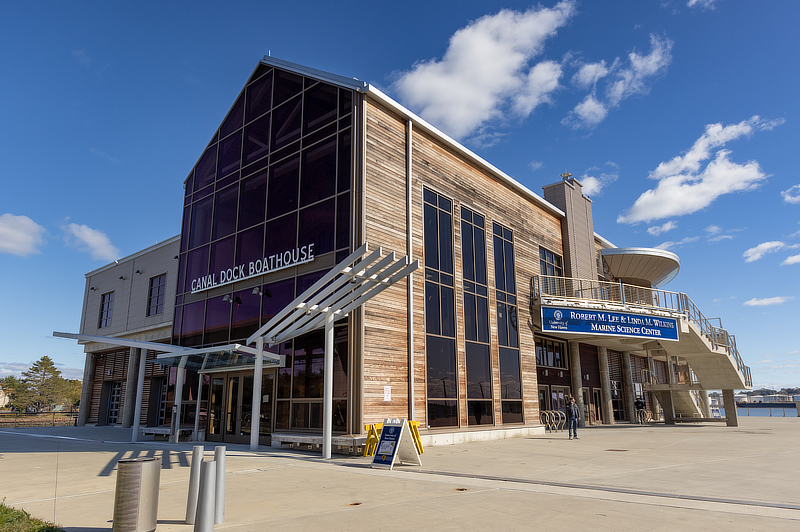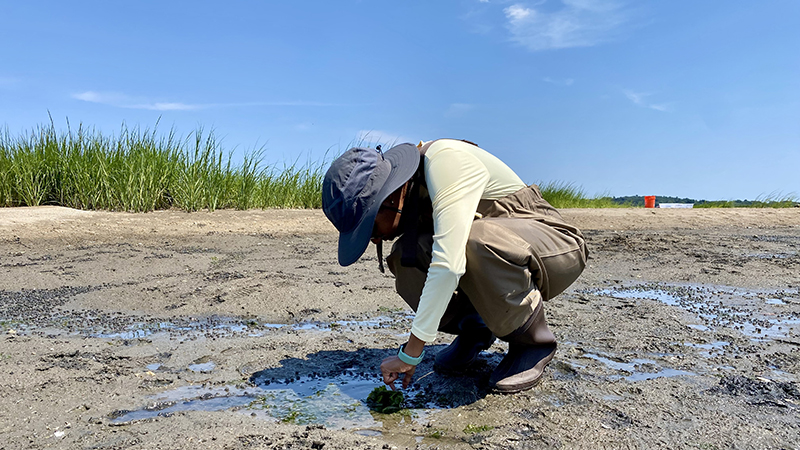An Ecosystem of Opportunity
If ever a program was built completely around hands-on, high-impact practical learning experiences, it’s this one: our B.S. in Marine and Environmental Sciences program. Starting with your first year, you will be in, on, and around the water, acquiring the skills that will help launch your professional career.
The coastal region of Connecticut is home to an extraordinarily rich diversity of species and ecosystems. As one of the most complex coastal estuarine systems in the world, Long Island Sound is a marine and environmental scientist’s paradise — and that paradise is only minutes from the University of New Haven campus. As you immerse yourself in the program and in the many field trips to these ecosystems, you will learn about all of the world’s oceans, terrestrial, and marine environments and organisms, and the fascinating ways humans interact with them. Humans are inextricably linked with the world’s oceans and coasts. For the world’s populations, these ecosystems have always served as sources of food, medicine, energy, commerce, education, recreation, and well-being. This program will give you a more profound knowledge of this interconnectedness through a multidisciplinary approach grounded in biological and earth sciences, social science, and policy.
Our B.S. in Marine and Environmental Sciences has three concentrations
you can choose from:
- Marine Biology
- Marine Policy
- Environmental Science
Why Choose the University of New Haven for Marine & Environmental Sciences?
- Students start major coursework in their first year. That’s uncommon. Most other schools insist on a year or two of prerequisites first. Our program puts you on the fast track to success.
- High-impact practical learning. Nothing sets you up for success like doing things for yourself. Students take the theory they learn in class and put it into practice through a number of hands-on learning opportunities, including:
- Service learning courses. Students gain first-hand experience by putting
their skills to work for the community.
- Study abroad. Students choose either semester-long programs at schools
in Australia, South Africa, and Scotland or shorter-term, faculty-led programs
in Alaska, Cape Cod, New Hampshire, and the Bahamas.
- Faculty-mentored research. Students work with faculty either during the school year or over the summer through grant-funded projects. They often present their work at scientific conferences.
- Internships. Our students have been successful in obtaining competitive internships through the National Oceanic and Atmosphere Administration and the National Science Foundation. They also intern at local aquariums and marine laboratories such as the Norwalk and Mystic aquariums and at nonprofits such as Save the Sound and Green Wave.
-
Magnificent field sites. The Banca Salt Marsh is an incredibly diverse, everchanging ecosystem in Branford, Connecticut, and is owned by the University. It’s a prime location for student field exercises and research projects. We also maintain a partnership with the Gerace Research Center on San Salvador Island in the Bahamas, where our students routinely take courses and engage in research.
-
An opportunity to study at the Isles of Shoals, made possible by the Bartels Scholarship. This group of small islands and tidal ledges, six miles off the coast between New Hampshire and Maine, is home to 256 species of invertebrates, 139 species of algae, 49 species of fish, and 145 species of birds, as well as a prestigious marine laboratory. Read about one student’s experiences at: newhaven.edu/shoals.
-
Career and graduate school placement. Our students experience a high rate of success after graduation in landing employment or admission to graduate schools, including veterinary and law schools. They hold positions at a wide range of private- and public-sector organizations, including nonprofits, federal and state government agencies, research institutions and universities, aquaculture companies, aquariums, private companies, and the Peace Corps.
+ Read More




